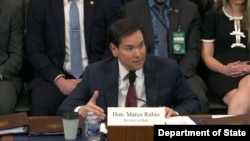“The most important thing [the United States] need(s) to do is return American foreign policy to be centered on our national interests,” declared Secretary of State Marco Rubio in recent Congressional testimony.
“For far too long, that had been lost as a concept of foreign policy. . . .[O]ftentimes the U.S. engaged in the world on the basis of what was good for the global order or the international community,” noted Secretary Rubio. While that made sense until the end of the post-Cold War era, it is no longer the case, he noted.
“We entered a new era about 12 or 14 years ago when we entered an era of near-peer competition, where, for the first time since the end of the Cold War, the United States had a near-peer competitor and adversary in the state of China. And we need to confront that, and our foreign policy needs to be geared around that and all the realities of this new world.”
That means the State Department must deliver on a foreign policy that is rooted in the national interests of the United States. And “every dollar we spend and every action we take has to have measurable outcomes that deliver for the American people,” stressed Secretary Rubio.
“They have to either make our country safer or they have to make our country stronger, or they have to help make our country more prosperous. It has to do at least one of those three things, and ideally, whether it’s a program or a measure that we take, it should do all three of them.”
Even as the United States prioritizes it foreign policy to serve its national interests, the U.S. remains the largest contributor of foreign aid and humanitarian assistance by far, said Secretary Rubio.
The State Department canceled US Agency for International Development contracts that “didn’t serve the national interest,” and kept others, said Secretary Rubio.
“And we are folding [USAID] under the Department of State. And you know why? Because we want it to be part of the toolbox of foreign policy, not a standalone.”
“[F]oreign aid has to be part of our portfolio,” stressed Secretary Rubio, “part of what we do, and it has to be consistent with our agenda in any region of the world or any country.”




